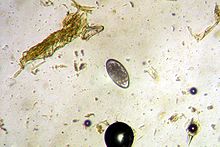Haemonchus contortus, also known as the barber's pole worm, is a very common parasite and one of the most pathogenic nematodes of ruminants. Adult worms attach to abomasal mucosa and feed on the blood. This parasite is responsible for anemia, oedema, and death of infected sheep and goats, mainly during summer in warm, humid climates.[2]
Females may lay over 10,000 eggs a day,[3] which pass from the host animal in the faeces. After hatching from their eggs, H. contortus larvae molt several times, resulting in an L3 form that is infectious for the animals. The host ingests these larvae when grazing. The L4 larvae, formed after another molt, and adult worms suck blood in the abomasum of the animal, potentially giving rise to anaemia and oedema, which eventually can lead to death.[4]
The infection, called haemonchosis, causes large economic losses for farmers around the world, especially for those living in warmer climates. Anthelminthics are used to prevent and treat these, and other, worm infections, but resistance of the parasites against these chemicals is growing. Some breeds, such as the West African Dwarf goat and N'Dama cattle, are more resistant than other breeds to H. contortus (haemonchotolerance).[5]
| Haemonchus contortus | |
|---|---|

| |
| These 11 Haemonchus contortus adult females were taken from one sheep infected with a single strain of this worm species. | |

| |
| Haemonchus contortus egg | |
| Scientific classification | |
| Kingdom: | Animalia |
| Phylum: | Nematoda |
| Class: | Chromadorea |
| Order: | Rhabditida |
| Family: | Trichostrongylidae |
| Genus: | Haemonchus |
| Species: | H. contortus
|
| Binomial name | |
| Haemonchus contortus (Rudolphi, 1803) Cobb, 1898
| |
| Synonyms | |
|
Haemonchus placei Place, 1893[1] (closely related species) | |
https://en.wikipedia.org/wiki/Haemonchus_contortus
No comments:
Post a Comment